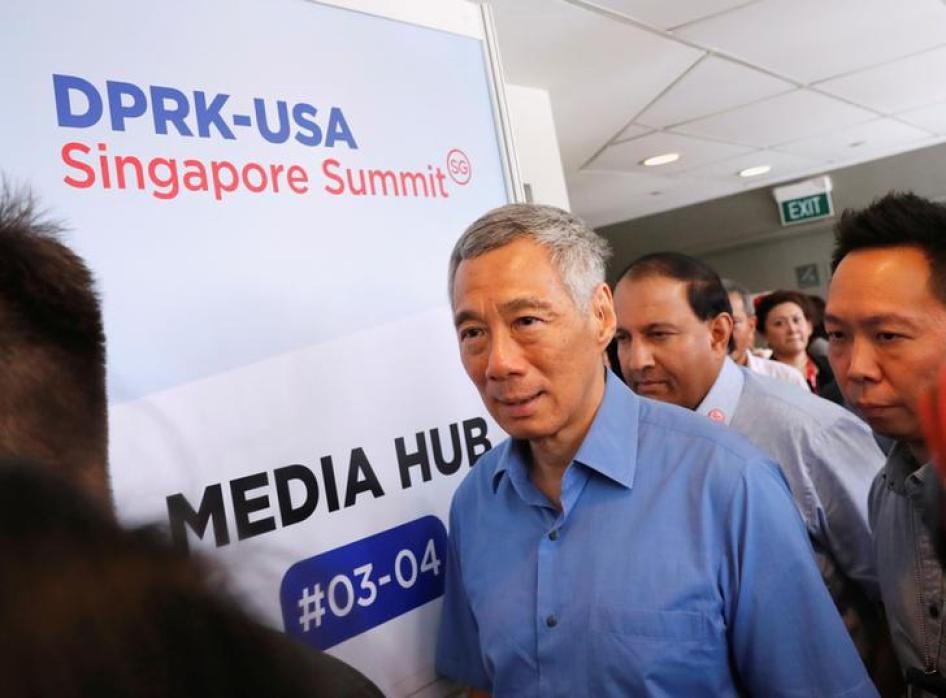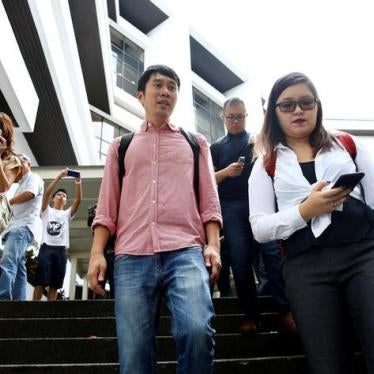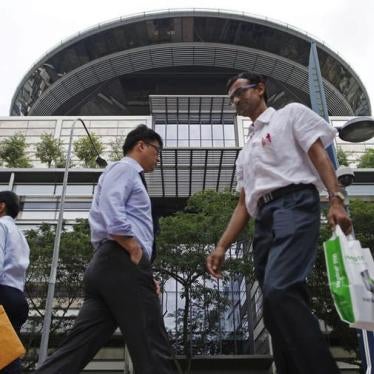(Bangkok) – The Singapore government should end the use of overly broad criminal and civil laws to restrict freedom of expression in the city-state, Human Rights Watch said today. The government should revise or repeal its defamation, sedition and contempt laws to bring them into line with international human rights law.
In a June 11, 2018 interview with CNN, Prime Minister Lee Hsien Loong stated that Singaporeans can say or publish what they want, “subject to the laws of sedition, libel and contempt.” Those laws, along with a range of regulatory measures, impose severe restrictions on the rights to freedom of speech in Singapore.
“There is little real freedom in Singapore to speak critically of the government or the courts, or to peacefully protest state policies,” said Phil Robertson, deputy Asia director at Human Rights Watch. “Singapore’s broad laws on contempt, sedition, and libel, among others, are aggressively used against activists, bloggers, cartoonists, and the foreign media to stifle critical speech.”
The government has frequently used libel suits against critics and the media, Human Rights Watch said. Prime Minister Lee sued Roy Ngerng, an activist who wrote a popular blog criticizing government actions and policies and highlighting inequalities in Singapore, for defamation over a blog post about the government’s handling of the Central Provident Fund, the country’s mandatory pension fund. Ngerng, who was fired from his job in the wake of the defamation suit, was ordered to pay Lee S$100,000 (US$74,500) in general damages, S$50,000 in aggravated damages, and S$29,000 in legal costs.
Under Singapore’s Administration of Justice (Protection) Act of 2016, it is considered contempt to publish anything that imputes improper motives to or impugns the integrity, propriety, or impartiality of any court and poses a risk that public confidence in the administration of justice would be undermined. Those found in contempt face up to three years in prison and a fine of up to S$100,000.
In the most recent case, Jolovan Wham, an activist, was charged with contempt for writing on Facebook on April 27 that, “Malaysia’s judges are more independent than Singapore’s for cases with political implications.” John Tan, the vice-chairman of the opposition Singapore Democratic Party, faces contempt charges for commenting on his Facebook page that Wham’s prosecution “only confirms that what he said is true.” Prime Minister Lee’s nephew, Li Shengwu, is also facing contempt proceedings over a private Facebook post in which he noted that a litigious government and a “pliant” judiciary meant that international media was constrained in what it could report about Singapore.
Singapore’s sedition law criminalizes speech that has a tendency to “bring into hatred or contempt or to excite disaffection against” the government or the administration of justice in Singapore, to “raise discontent or disaffection” among the inhabitants of Singapore, or to “promote feelings of ill-will and hostility between different races or classes of the population of Singapore.” Violation of the law carries a penalty of up to three years in prison. Given that almost any criticism can “excite disaffection against” the government, and any discussion of race and religion can “raise discontent,” the law imposes unacceptable restrictions on discussion of matters of public interest, Human Rights Watch said.
“Singapore should bring its laws on freedom of speech into line with international standards, as the new government in nearby Malaysia has committed to do,” Robertson said. “Only then will Singaporeans be free to speak their minds.”









